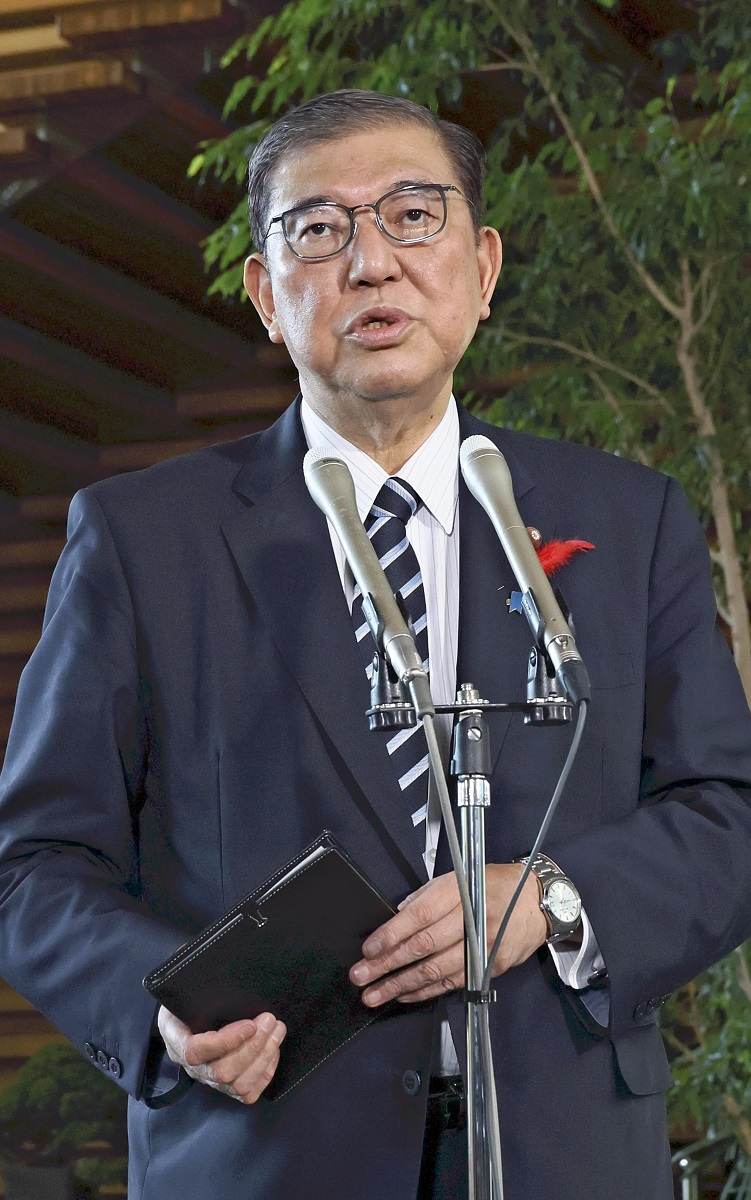Ishiba, Biden Reaffirm Need to Deepen Japan-U.S. Alliance in Telephone Talks; Status of Forces Agreement Not Discussed

Prime Minister Shigeru Ishiba speaks to reporters at the Prime Minister’s Office on Wednesday.
17:22 JST, October 2, 2024
Prime Minister Shigeru Ishiba on Wednesday reaffirmed with U.S. President Joe Biden the importance of enhancing the deterrence and response capabilities of the Japan-U.S. alliance.
The night after the inauguration of his Cabinet, Ishiba held talks with his U.S. counterpart for about 15 minutes over the phone. The new prime minister did not mention his signature idea of revising the Japan-U.S. Status of Forces Agreement, despite calling for it during the Liberal Democratic Party’s presidential election.
During the talks, the prime minister said that strengthening the Japan-U.S. alliance is his administration’s top priority and called on the United States to continue to work closely together with Japan as global partners who play a central role in maintaining the international order. Ishiba also conveyed his intention to enhance Japan’s defense budget and its equipment in order to strengthen defense capabilities.
With China’s increasingly hegemonic behavior in mind, the two leaders reaffirmed the need to develop multilateral networks of like-minded countries, such as by cooperating with Australia and India in the Quad as well as in trilateral partnerships with South Korea and with the Philippines. Ishiba and Biden also agreed to cooperate on the issues of North Korea’s abductions and its nuclear and missile development as well as the situation in Ukraine.
The two leaders shared strong condemnation of Iran’s launch of ballistic missiles into Israel, with both expressing concern over the possibility that the situation in the Middle East will evolve into an all-out war across the entire region.
“I feel that we had a very lively conversation,” Ishiba told reporters at the Prime Minister’s Office. “I told him that I would like to continue to have opportunities for summit talks centered on the United States, such as one between Japan, the United States and South Korea. He agreed.”
Regarding the revision of the Japan-U.S. Status of Forces Agreement, Ishiba said: “I did not go into specifics. I hope to discuss the matter in the future when I have the opportunity.”
With regard to the management of the administration, Ishiba stressed again that he would “squarely face the people and work to gain their understanding and sympathy.”
The prime minister also expressed his eagerness for the upcoming House of Representatives election, which will be held on Oct. 27. “I want to face the election head-on with all my heart and soul without running away,” he said.
New Foreign Minister Takeshi Iwaya, during a meeting on Wednesday with his predecessor Yoko Kamikawa to hand over duties at the Foreign Ministry, said, “I am determined to carry out diplomacy without failure, bearing in mind that failure in diplomacy leads the country in the wrong direction.”
Economic revitalization minister Ryosei Akazawa, who is in charge of preparing for the establishment of an agency to deal with disasters told reporters, “Since it is the administration’s centerpiece project, I want to put in my utmost effort and get results.”
Related Tags
Top Articles in Politics
-

Japan PM Takaichi’s Cabinet Resigns en Masse
-

Sanae Takaichi Elected Prime Minister of Japan; Keeps All Cabinet Appointees from Previous Term
-

Japan’s Govt to Submit Road Map for Growth Strategy in March, PM Takaichi to Announce in Upcoming Policy Speech
-

LDP Wins Historic Landslide Victory
-

LDP Wins Landslide Victory, Secures Single-party Majority; Ruling Coalition with JIP Poised to Secure Over 300 seats (UPDATE 1)
JN ACCESS RANKING
-

Japan PM Takaichi’s Cabinet Resigns en Masse
-

Japan Institute to Use Domestic Commercial Optical Lattice Clock to Set Japan Standard Time
-

Israeli Ambassador to Japan Speaks about Japan’s Role in the Reconstruction of Gaza
-

Man Infected with Measles Reportedly Dined at Restaurant in Tokyo Station
-

Videos Plagiarized, Reposted with False Subtitles Claiming ‘Ryukyu Belongs to China’; Anti-China False Information Also Posted in Japan






















